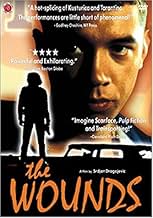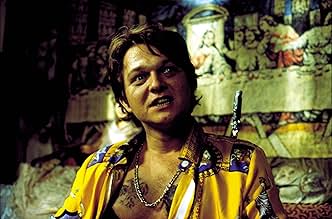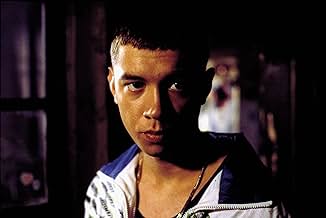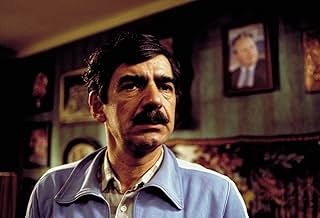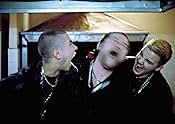This film follows two Belgrade youths on their rise to gangster legends in a decaying society.This film follows two Belgrade youths on their rise to gangster legends in a decaying society.This film follows two Belgrade youths on their rise to gangster legends in a decaying society.
- Awards
- 4 wins total
Predrag 'Miki' Manojlovic
- Stojan
- (as Miki Manojlovic)
Zorka Manojlovic
- Svabina baka
- (as Zora Manojlovic)
Radoslav 'Rale' Milenkovic
- Inspektor
- (as Rale Milenkovic)
Nikola Pejakovic
- Kafedzija
- (as Nidzo Pejakovic)
- Director
- Writer
- All cast & crew
- Production, box office & more at IMDbPro
Featured reviews
It's a shame there is no U.S. distribution yet. I got a chance to see this film at the SF film fest and it was brilliant. It definitely has some elements of Scarface along with a coming of age story of a boy in a war torn country. This film Rules!
Dark, bleak, hopeless, harsh, uncompromising, periodically injected with black humor, but overall quite powerful - Srdjan Dragojevic's follow-up to "Pretty Village, Pretty Flame," weaves a tragic coming of age story in Yugoslav capital Belgrade during the turbulent 90's with all the sharp cultural, social, political references and critique one could ask for. This film actually fits more along the lines of "Cabaret Balkan," except that "Rane" has this gangster twist to it. Among the supporting actors I noticed a lot of familiar faces such as Miki Manojlovic, Dragan Bjelogrlic, Branca Katic, Nikola Kojo, who you may be familiar with from films like "Underground," "Black Cat, White Cat," above mentioned "Pretty Village, Pretty Flame" and "Cabaret Balkan" and such. Definitely recommended if you are interested in Serbia/Yugoslavia or Serbian film making.
Actually it makes me feel sick, because it is so true.Man it really was like that.So now it's too painful to watch it.The life in Serbia isn't brilliant now, but I'm glad to see that the age from the movie is gone, and gone!Just to say that advertising of Rane was forbidden by "Milosevic TV"(RTS), and what an irony they had invested in the film. I would recommend it to anyone who wants to see how much of the crap hole life can be!
How easy is it for desperate youngsters to become dangerous gangsters in a decaying society washed all over by the blood of war? Fairly easy indeed. Rane shows incidents, probably somewhat facts, that took place in Serbia of the war era. Things similar to what you see on this film could happen virtually everywhere, but this film gives a very Yugoslavian feeling to everything. Yugo style mafia, Yugo style murder, and all that. Revolting politicians and their greed are to blame, not only the desperate young men who lose their reasoning while trying to be someone. The film and the casting is overall successful, and it's so very Serbian. I recommend it to anyone who.. well anyone who likes a good film. But don't expect anything American style on this one, as I say it's Yugo to the bone. 9/10.
Srdjan Dragojevic dedicates his film 'The Wounds' to "post-Tito generations," and it can be seen as of a piece with his previous film 'Pretty Village, Pretty Flame,' an allegory concerning the Bosnian conflict that was one of the angriest, most jarring anti-war films I've seen. 'The Wounds' is an even more aggressive film, told in non-linear fashion, like 'Pretty Village,' beginning in 1996, coiling five years back in time, and progressing to its starting point, so that the events that follow from thereon have an even greater immediacy. The storyteller is a young man named Pinki, born on the day of Marshal Tito's death, named such because his father was arrested after naming him "Tito" -- in honor of the fallen leader, but interpreted by authorities as an insult.
Pinki and his pal Kraut idolize a gangster known as Dickie, who lives in the same housing project. Dickie, an impulsive sociopath who carries a gun at all times and fires it into his television set at random, takes them under his wing and grooms them to become violent criminals. The film, by this point, may begin to remind a viewer of 'GoodFellas,' or the more current 'City of God,' from Brazil. But while those films were stylistically bold, this film is stylistically outrageous. Srdjan Dragojevic slings acid in the face of the viewer, forever surprising his audience with uncompromising nastiness. One does not grow inured to the shocks, however, because the shocks have poetry and relevance, and the movie is tremendously entertaining. This is very exciting filmmaking, the likes of which dwarfs recent work from American filmmakers like Scorsese and Tarantino. Furthermore, it's probably better than anything else from the arguably competitive recent spate of films from the former Yugoslavia, all of which yield a collective cry of anger in the face of the Bosnian civil war, the social conditions of that region, and the region's recent history.
Like other Yugoslav films, 'The Wounds' employs a burlesque tone in its depiction of sexuality, violence, social revolt, and family strife, and yet it does so with such conviction that the movie becomes hypnotic. It would be satire, except its anger is so palpable. It would be allegory, except its writing is so vivid. Whatever it is, it's not easily forgotten.
Pinki and his pal Kraut idolize a gangster known as Dickie, who lives in the same housing project. Dickie, an impulsive sociopath who carries a gun at all times and fires it into his television set at random, takes them under his wing and grooms them to become violent criminals. The film, by this point, may begin to remind a viewer of 'GoodFellas,' or the more current 'City of God,' from Brazil. But while those films were stylistically bold, this film is stylistically outrageous. Srdjan Dragojevic slings acid in the face of the viewer, forever surprising his audience with uncompromising nastiness. One does not grow inured to the shocks, however, because the shocks have poetry and relevance, and the movie is tremendously entertaining. This is very exciting filmmaking, the likes of which dwarfs recent work from American filmmakers like Scorsese and Tarantino. Furthermore, it's probably better than anything else from the arguably competitive recent spate of films from the former Yugoslavia, all of which yield a collective cry of anger in the face of the Bosnian civil war, the social conditions of that region, and the region's recent history.
Like other Yugoslav films, 'The Wounds' employs a burlesque tone in its depiction of sexuality, violence, social revolt, and family strife, and yet it does so with such conviction that the movie becomes hypnotic. It would be satire, except its anger is so palpable. It would be allegory, except its writing is so vivid. Whatever it is, it's not easily forgotten.
Did you know
- TriviaThe screenplay is inspired by true events experienced by Besa and Marko, two school fellows of Ivan Ivanovic, a famous serbian Tv comedian who hosts the renowned Talk Show "The night with Ivan Ivanovic".
- ConnectionsReferenced in We Are Not Angels 2 (2005)
- How long is The Wounds?Powered by Alexa
Details
Contribute to this page
Suggest an edit or add missing content


